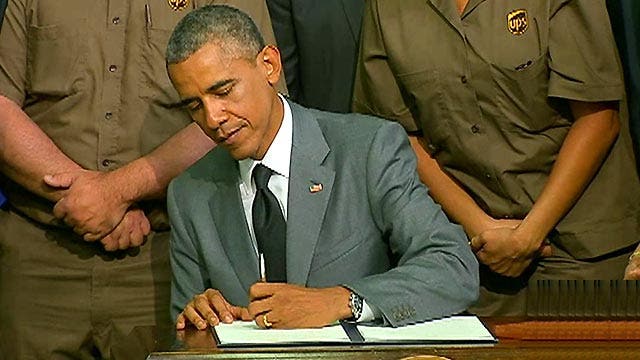Obama continues 'go it alone' strategy to get things done
A look at president's latest executive order
In 2008 and 2009, Barack Obama gave two foundational foreign policy speeches, first in Berlin as the Democratic presidential candidate and then in Cairo as the newly minted president of the United States. With his signature self-assuredness, on full display he declared: “any world order that elevates one nation or group of people over another will inevitably fail.”
I point to these speeches, which are worth rereading, not to rebut his foreign policy, or even to argue with it, but to bury it.
Flush with platitudes, both speeches were devoid of serious substance; Obama never had a real foreign policy, as later attempts to coin “lead from behind” and “don’t do stupid sh*t” doctrines laid bare. The false promise of the Obama approach to foreign affairs—cooperation, understanding, and “international community”—has instead led to chaos, undermining our allies, and an international march of Islamists and despots.
[pullquote]
On Obama’s watch, only one foreign policy maxim has held consistently true: abdicating American leadership by neutering American power.
Obama cut his political teeth amongst the “blame America first” crowd; where America is the problem, not the solution. His speeches hedge on this notion, but the manifestation of his policies hold true: U.S. power around the globe has ebbed, the world has grown more restive, and the number of “hot spots” has skyrocketed.
Al Qaeda 2.0 has established an ambitious and brutal “Islamic State” in Iraq, erasing hard-won gains; Afghanistan is poised to go over the same cliff as the administration rushes for the exits; Iran continues to pursue a game-changing bomb, while eagerly funding terror against Israel; Putin’s Russia displays increasing belligerence; Libya, Syria, Gaza—in flames. The list goes on.
Conservatives have rightly spent years pointing to the dangers of Obama’s unilateral disarmament, noting that American weakness—absent another international guarantor of freedom—invites aggression. That argument is now over—the president’s critics, at home and abroad, are correct in their measure of the man.
That leaves conservatives—scarred from the Iraq War for the right and wrong reasons—seeking an alternative vision of what U.S. foreign policy could be in 2017 (George Will’s call for “conservative internationalism” is a recent example). The contours of a “conservative foreign policy” will be intensely debated for the next few years, a development we should welcome.
But as we start that conversation, we also need to deal with a more pressing issue: what to do in the next two years, as a pragmatic and loyal opposition, to prevent the world from slipping even further into chaos?
For the remainder of Obama’s presidency, we can’t expect coherence in dealing with foreign challenges. Instead, we should work to keep the free world from imploding before America can re-arrive on the scene. Our approach should be pragmatic, clear-eyed, and centered on the national security interests of America and our allies.
In short, we should fight to ensure America keeps “mowing the lawn.” As this administration willfully sits on the porch of history and sips a beer, the seeds of international radicalism are exploding. We don’t have time to wait for ideological pesticides or economic weed-control—we need to cut the grass now, before it engulfs the entire lawn. You get the analogy: radical Islamists are the grass, America is the lawn-mower, and we need to cut them down—to the shortest length possible.
A pair of Israeli policy thinkers recently described their nation’s approach to dealing with Hamas the same way—a “mowing the grass” strategy—that, while not a long term solution, is the best-bad way to deal with a “protracted intractable conflict.” America faces the same long-war from radical Islamists. Mowing the grass means the focus will not be on defeating dangerous actors—like the Islamic State, Al Qaeda, the Taliban (Afghanistan and Pakistan-type), Hezbollah, Al Nusra Front and others—but merely on degrading their ability to strike U.S. interests.
This pragmatic, if blunt, approach requires military assets America still has: power-projection platforms, small, regional footprints, intelligence networks, technological advantages, highly skilled operators, and a Congressional “authorization for use of military force against terrorists.” It also includes influence the White House can still muster: collaboration with global and local allies and shoring up congressional will. For years, America has quietly been “at war” with radical Islamists in Yemen who seek international reach, yet the public shrugs. Why not replicate this approach elsewhere?
Preferably, diplomatic progress, economic incentives, and international cooperation would suffice; but as Obama has discovered the hard way, the world exists as it is—not as we wish it to be. With Obama at the helm, and U.S. power diminished, these softer approaches simply have not worked. As such, mowing the lawn—killing those who seek to destroy us, our allies, and our way of life—is the most judicious application of U.S power in the next two years. The president has shown a begrudging willingness to use this power in the past (see Bin Laden raid and drone strikes) and has an incentive not to leave the world completely aflame in 2017.
This approach won’t work everywhere—it doesn’t provide a satisfying answer for meeting Putin’s aggression in Ukraine, for instance, or for dealing with the inevitable next round of madness from North Korea. It’s essentially a strategy of “muddling through”—or “whack-a-mole” where we actually whack—until the White House is occupied by a commander in chief who grasps the concept that a) America has enemies; b) only America can confront those enemies; and c) and American power is essential to a stable and secure world order.
The dark lesson of the past six years, as our adversaries grasped and Obama never did, is that power vacuums invite challenge and violence. Yet unlike his domestic policies, Obama’s failures are America’s failures—and things could get much worse in two years; turning our unkempt lawn into intractable thicket. We must help mow the rapidly growing grass until a real lawn-care professional arrives on scene.









































